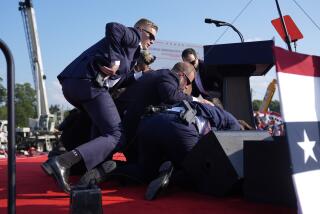Little Security in More Security Laws : The keys are better enforcement and funding
- Share via
In the aftermath of the Oklahoma City bombing, new laws may do less for security than the strict enforcement of existing laws. By law, 1,000 uniformed federal officers are to guard the 8,200 federal buildings around the country. In fact, cost cutbacks have meant that fewer than 400 are on duty. As the number of officers has declined, the number of breaches of security has risen.
To correct this situation, Congress need not pass a new law; it need only appropriate money to implement the existing laws. In 1988 it moved to increase the size of the federal security force from 750 to 1,000, but, starved for funding, the force has instead shrunk dramatically. The slack has been partially taken up by 2,300 unarmed “contract guards,” but in the rueful words of one official, “With a lot of these security firms, you have the equivalent of greeters.” Greeters are not going to be enough in the face of any future attacks against federal personnel.
Nuclear power plant security is another area where the aggressive implementation of existing regulation is called for. The casualties suffered in Oklahoma City would pale by comparison to those that would be suffered were a comparable explosion to induce meltdown at a nuclear power plant. Last Tuesday, on the eve of the ninth anniversary of the Chernobyl meltdown, Ukrainian Health Minister Andrei Serdyuk released the latest, most disturbing estimate of the eventual death toll: 125,000, with a disproportionate share of casualties among children, pregnant women and rescue workers. A huge area is now permanently uninhabitable: More than 140,000 people have had to move. Chernobyl appears to be responsible for a 16% rise in the death rate in northern Ukraine, according to Ukrainian officials; the peak in radiation-caused cancers is expected to come in the next decade.
Last August, responding to fears aroused by the 1993 truck bombing of the World Trade Center in New York, the Nuclear Regulatory Commission required nuclear power plants to install barriers against similar sabotage. It should be noted, however, that the plants were given 18 months to comply with the regulation and only nine months have elapsed.
The message of the World Trade Center bombing was “It can happen in America.” The message of the Oklahoma City bombing is “It can happen anywhere in America.” No further warning should be needed to implement anti-truck bomb measures at nuclear power plants on an accelerated schedule and to bring the force of armed, uniformed, salaried guards at federal buildings immediately to the level that the law requires.
More to Read
Sign up for Essential California
The most important California stories and recommendations in your inbox every morning.
You may occasionally receive promotional content from the Los Angeles Times.










